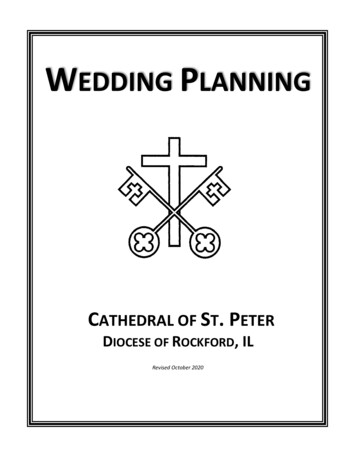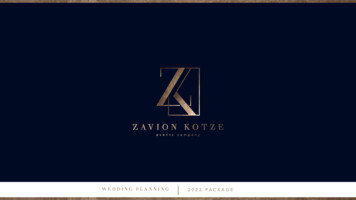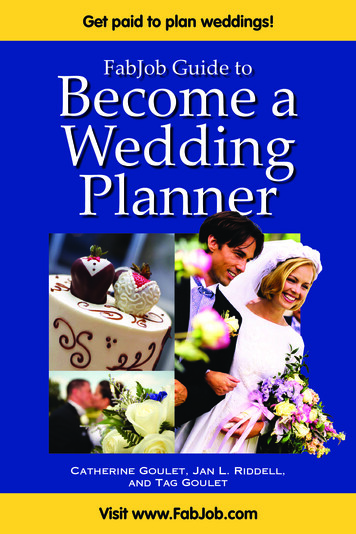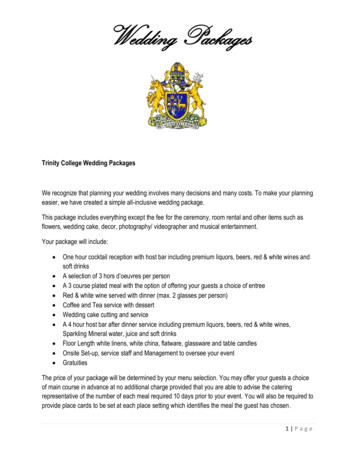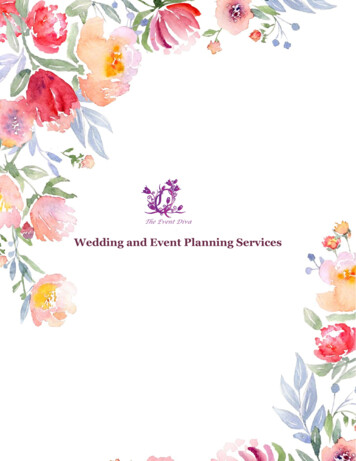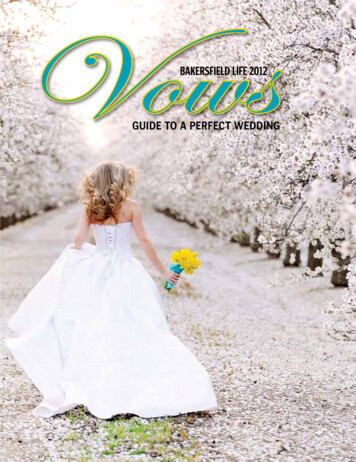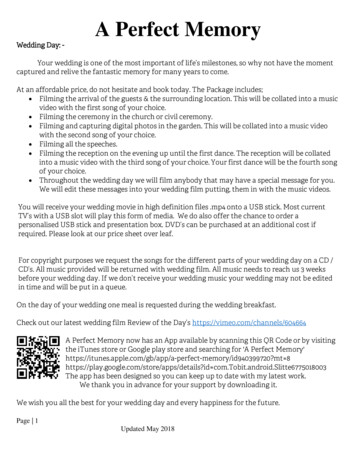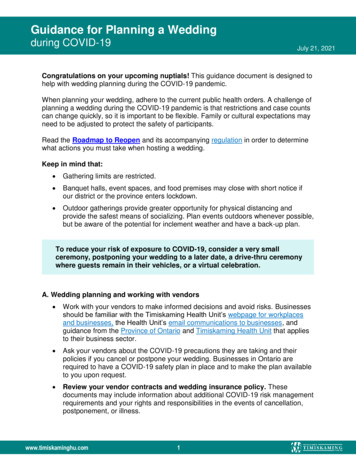
Transcription
Guidance for Planning a Weddingduring COVID-19July 21, 2021Congratulations on your upcoming nuptials! This guidance document is designed tohelp with wedding planning during the COVID-19 pandemic.When planning your wedding, adhere to the current public health orders. A challenge ofplanning a wedding during the COVID-19 pandemic is that restrictions and case countscan change quickly, so it is important to be flexible. Family or cultural expectations mayneed to be adjusted to protect the safety of participants.Read the Roadmap to Reopen and its accompanying regulation in order to determinewhat actions you must take when hosting a wedding.Keep in mind that: Gathering limits are restricted. Banquet halls, event spaces, and food premises may close with short notice ifour district or the province enters lockdown. Outdoor gatherings provide greater opportunity for physical distancing andprovide the safest means of socializing. Plan events outdoors whenever possible,but be aware of the potential for inclement weather and have a back-up plan.To reduce your risk of exposure to COVID-19, consider a very smallceremony, postponing your wedding to a later date, a drive-thru ceremonywhere guests remain in their vehicles, or a virtual celebration.A. Wedding planning and working with vendors Work with your vendors to make informed decisions and avoid risks. Businessesshould be familiar with the Timiskaming Health Unit’s webpage for workplacesand businesses, the Health Unit’s email communications to businesses, andguidance from the Province of Ontario and Timiskaming Health Unit that appliesto their business sector. Ask your vendors about the COVID-19 precautions they are taking and theirpolicies if you cancel or postpone your wedding. Businesses in Ontario arerequired to have a COVID-19 safety plan in place and to make the plan availableto you upon request. Review your vendor contracts and wedding insurance policy. Thesedocuments may include information about additional COVID-19 risk managementrequirements and your rights and responsibilities in the events of cancellation,postponement, or illness.www.timiskaminghu.com1
Try to be kind and flexible when working with your vendors. Businesses,including the wedding industry, have been impacted by the pandemic. Create a backup plan, which may include a smaller or virtual ceremony or abackup date in case a person who must be at your wedding (such as a memberof the couple or your officiant) becomes ill.B. TravelIndividuals traveling to a wedding should be aware of travel restrictions in the districtsthat they are travelling to and from. When booking travel, consider that restrictions canchange with short notice. During your trip, follow public health guidelines. Travelrecommendations from the Timiskaming Health Unit are available here.C. Follow gathering restrictionsTo help prevent the spread of COVID-19, the Government of Ontario has implementedmandatory restrictions on the number of people who can attend gatherings. Note thatgathering limits differ for wedding ceremonies and wedding receptions.These gathering limits are the maximum allowed if all staff and guests maintain aphysical distance of 2 metres. An indoor gathering cannot be combined with an outdoorgathering to increase the limit on the number of attendees. Vendors count towards yourgathering limit unless employed directly by the venue.To see gathering limits for wedding ceremonies in each stage of the Government ofOntario’s 3-step Roadmap to Reopening, click here and scroll down to the heading“Religious services, rites or ceremonies, including wedding services and funeralservices (does not apply to receptions).”Gathering limits for wedding receptions are found in the same document. If your wedding is held at a private residence, click here and scroll down to theheading “Gatherings.”If your wedding is held in any other location, click here and scroll down to theheading “Meeting and event spaces.”D. Safety plans Become familiar with the safety plans of your venue and vendors. All businessesin Ontario are required by law to have a written safety plan. Safety plans must beposted in a conspicuous location and available by request. Consider creating a safety plan for your wedding, using the safety plan resourcesavailable here.www.timiskaminghu.com2
E. Communicate with guests before the event Use technology, such as a wedding website or social media, to inform yourguests about the precautions you are taking to keep everyone safe. Inform attendees that masks are required, unless exempt. Ask attendees to bringtheir own masks. Provide extras in case guests forget, lose, or soil their masks. Require guests to stay home if they are feeling unwell. If anyone who plans toattend your wedding, including the couple, develops symptoms of COVID19, the ill person and members of their household must stay home and selfisolate, even if they are fully vaccinated. If hosting a virtual service, post instructions on how to access it online.F. Remind guests to follow COVID-19 precautions Screen attendees. A screening poster must be posted at entrances of all venuesin Ontario. Most venues are also required to actively screen patrons by askingscreening questions. For information about which venues must actively screen,please see the regulation. Use a variety of methods, including verbal announcements, signage, and prewedding communications, to remind guests to follow public health measures.Measures include staying home if they are sick, physical distancing, wearing amask or face covering, handwashing, covering coughs and sneezes, anddownloading the COVID-19 Alert app. Remind guests to refrain from hugging,kissing, and shaking hands. Note that certain signage is required. For a list ofrequired signage and a link to all available posters, click here. Arrange seating by household and space members of different households atleast 2 meters apart. Manage the flow of individuals to prevent crowding and maintain 2 metreseparation. Consider entrances, exits, hallways, and washrooms, as well aswedding traditions such as a reception line. Use floor markings to encourageguests to maintain physical distancing. Have hand sanitizer available at entrances, exits, and other locations as needed.G. Follow face mask requirements Masks are required by law in all indoor public spaces and in indoorworkplaces. You should wear a mask indoors and outdoors when it’s difficult tomaintain a distance of 2 meters from people who don’t live with you. The couple may remove their masks during the wedding ceremony. Guests must wear their masks at all times and may only remove them wheneating. Remind guests to wear their mask so that it covers their nose, mouth, andwww.timiskaminghu.com3
chin. Special vigilance should be paid to masking if guests are singing, since thisis a higher-risk activity. If the wedding involves performers such as musicians or dancers, performersmust follow mask requirements and other requirements that are listed in theRoadmap to Reopen and its accompanying regulation. A list of people who are exempt from wearing a mask is available here.H. Increase ventilation Increase ventilation by opening windows and increasing air exchange settings onHVAC systems, if possible. Ensure HVAC systems are properly maintained and replace filters asappropriate. Arrange furniture away from air vents and high airflow areas; direct fansupwards, away from people.I. Modify your wedding plans Follow public health measures while getting ready for your wedding. The safestoption is to get ready with members of your household only. If you decide to getready with people outside your household (for example, members of a weddingparty), follow gathering limits and wear a mask if it’s difficult to maintain a 2-metredistance from people you don’t live with. Do not share personal items, forexample makeup brushes. Avoid sharing objects (for instance, ceremonial objects, microphones used duringwedding toasts, photo booth props). For guestbook signing, use a new pen foreach guest or create an online guestbook. Consider individual hand sanitizer and personalized masks as gifts for guests. Limit close group photos to people in the same household. Wear a mask indoorsand outdoors when it’s difficult to maintain a distance of 2 meters from peoplewho don’t live with you. Consider limiting alcohol service to prevent guests from relaxing physicaldistancing measures.J. Food and drinkFood and drink restrictions vary significantly based on the province’s level in theRoadmap to Reopen. For more details, see the Roadmap to Reopen and itsaccompanying regulation, or work with an experienced caterer who is familiar with therestrictions.www.timiskaminghu.com4
K. Singing, music, and entertainment Singing and musical wind instruments can project respiratory droplets furtherthan two metres, and are higher risk activities. Special vigilance should be paid tomasking if guests are singing, since this is a higher-risk activity. Congregational singing is strongly discouraged, even with masks. Consider pre-recorded music or virtual performances. Vocalists and other musicians must maintain a physical distance or performbehind a barrier such as plexiglass. Musicians should physical distance fromeach other and from guests, and should wear a mask when not performing. If live or recorded music is used, keep the volume low so the officiant, guests andstaff do not need to speak louder, or lean closer to hear the conversation. Performers and officiant should have their own microphone. Do not sharemicrophones.L. Attendance list for contact tracing Keep a list of your guests and vendors in attendance, including phone numbers.If you have an existing vendor contact list and guest RSVP list, use them forcontact tracing purposes as well. Information collected can only be used bypublic health for COVID-19 contact tracing. The attendance list can be deletedafter 30 days. Encourage your guests to download the COVID Alert app. If anyone develops symptoms of COVID-19, the ill person and members of theirhousehold must go home and self-isolate, even if they are fully vaccinated.www.timiskaminghu.com5
help with wedding planning during the COVID-19 pandemic. When planning your wedding, adhere to the current public health orders. A challenge of planning a wedding during the COVID-19 pandemic is that restrictions and case counts can change quickly, so it is important to be flexible. Family or cultural expectations may

